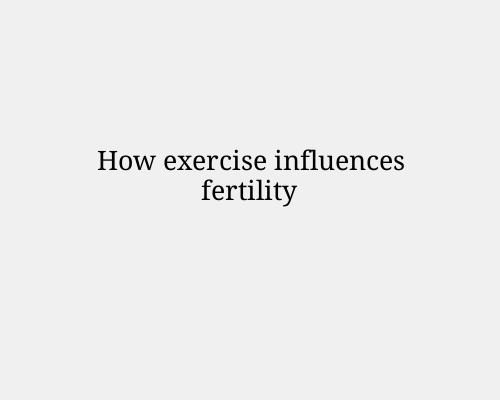
Exercise is a key factor in overall health, but its impact on fertility is complex. Both too little and too much physical activity can influence reproductive hormones, ovulation, sperm production, and overall reproductive health. The right balance can enhance fertility, while extremes—either inactivity or overtraining—may lead to challenges in conception.
The role of exercise in female fertility
Weight management and hormonal balance
Maintaining a healthy weight is crucial for fertility. Excess body fat can lead to hormonal imbalances, increasing oestrogen levels, which may disrupt ovulation. On the other hand, being underweight can lower oestrogen and progesterone levels, leading to irregular or absent menstrual cycles (amenorrhea).
Moderate exercise can help maintain a healthy body mass index (BMI), supporting normal hormonal function and regular ovulation.
Impact on ovulation and menstrual cycle
Moderate exercise supports regular ovulation by regulating insulin levels and improving metabolic health.
Excessive exercise, especially combined with calorie restriction, can suppress reproductive hormones like luteinizing hormone (LH) and follicle-stimulating hormone (FSH), leading to irregular periods or even anovulation (lack of ovulation).
Polycystic Ovary Syndrome (PCOS): Women with PCOS often experience irregular ovulation due to insulin resistance. Exercise improves insulin sensitivity, which can help restore ovulation and increase pregnancy chances.
Effects of overtraining on fertility
Intense endurance training (e.g., marathon running, extreme weightlifting) can elevate cortisol levels, disrupt reproductive hormones, and lead to hypothalamic amenorrhea, where the brain signals the ovaries to stop ovulation. Women engaging in high-intensity exercise without adequate recovery may experience fertility struggles.
The role of exercise in male fertility
Impact on sperm quality
Regular, moderate exercise improves sperm quality, motility, and concentration. It boosts testosterone levels and enhances blood flow to reproductive organs. However, excessive exercise, particularly endurance training (such as long-distance running or cycling), may lower testosterone levels, reduce sperm count, and impair sperm function.
Heat and fertility
Activities that increase testicular temperature—such as prolonged cycling, hot yoga, or sauna use—can negatively impact sperm production. Sperm require a cooler environment, so men trying to conceive should be mindful of overheating the testes.
Hormonal influence
Exercise can regulate hormones crucial for male fertility, such as testosterone and follicle-stimulating hormone (FSH). While moderate resistance training enhances testosterone, excessive endurance training can lead to hormonal imbalances, reducing sperm quality.
Exercise recommendations for optimal fertility
To maximize fertility benefits, both men and women should aim for a balanced exercise routine:
Engage in moderate-intensity workouts (30–60 minutes, 3–5 times a week), such as brisk walking, swimming, yoga, or light strength training.
Avoid extreme endurance exercise or overtraining, particularly if experiencing irregular cycles or fertility issues.
Incorporate stress-reducing activities like yoga, Pilates, or mindfulness exercises to lower cortisol levels, which can interfere with reproductive hormones.
Maintain a healthy weight through a combination of exercise and a balanced diet, as both underweight and overweight conditions can impact fertility.
Conclusion
Exercise has a significant influence on fertility, but balance is key. Moderate activity enhances reproductive health, improves ovulation and sperm quality, and supports overall well-being. However, excessive exercise can disrupt hormonal balance and negatively impact fertility. Couples trying to conceive should adopt a well- rounded fitness approach that supports optimal reproductive function.